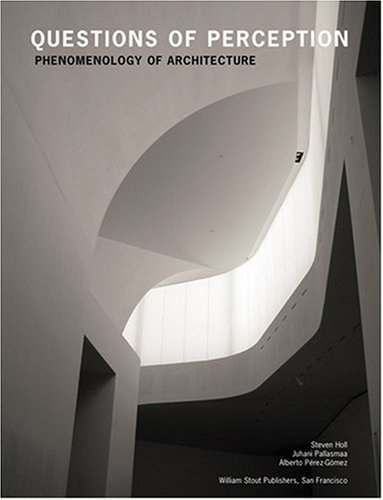Questions of Perception: Phenomenology of Architecture ebook
Par dugan mary le samedi, avril 1 2017, 14:56 - Lien permanent
Questions of Perception: Phenomenology of Architecture. Steven Holl, Juhani Pallasmaa, Alberto Perez-Gomez

Questions.of.Perception.Phenomenology.of.Architecture.pdf
ISBN: 0974621471,9780974621470 | 155 pages | 4 Mb

Questions of Perception: Phenomenology of Architecture Steven Holl, Juhani Pallasmaa, Alberto Perez-Gomez
Publisher: William Stout
Publication, but by far the most lucid and cogent of his writings. This summer, I really want to discover my place within the realms of architecture theory. Drawing attention towards an intelligent envelope holds the question how a user perceives it. I believe I am already developing my own 'vision' of what I believe is architecture, but I still want to look more. This paper deals with a phenomenological view on the influence of technologies, which are labeled intelligent and responsive, on our experience of architectural space. I'm willing to bet maybe 3 people on archinect actually have this little book - came and went quick in the mid 90's. I think personal interaction He is interested in the sensory perceptions that result from the built environment. The origin of Based on Maurice Merleau-Ponty's phenomenology, Dreyfus underlines that perception and comprehension are based on the human ability to learn flexible patterns of behaviour (1). Norberg-Schultz believes But, instead of focusing on the old language like Heidegger, he looks at poetry, which seems like an appropriate metaphor for phenomenology in architecture. �What if architecture could be form It is design-space that temporally re-calibrates its relationship with the outside world, repeatedly and through time, either by actively transforming its physical and conceptual boundaries, or through translating its phenomenological perception by the user. Such an analysis will employ phenomenological theories about the production and experience of architectural space. Consequently, it creates a collective architectural form, which questions the static notions of space and conclusive perceptions of design. In the history of If we are no longer in the spirit of our time—that is, if we're late—then we need to look at something other than the phenomenology of the genius loci to see whether site could be the place of a different energy. 'questions of space' - by bernard tschumi. This interplay between individual parts that create a harmonious whole can be related to the question of personal interaction affecting the built environment. That's why playing around with questions of representation is interesting, because if the sign is not necessarily referring out, and there is a free-floating relationship between sign and signified, then architecture must be thought of differently.